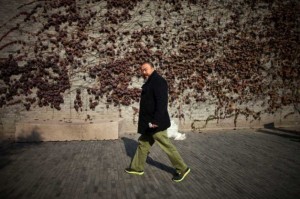Ai Weiwei – An Artist’s Stand
Interview: http://artistsspeakout.com
www.aiweiwei.com/ wikipedia.org/Ai_Weiwei
www.financialtaskforce.org/about/overview
#video www.makeaidtransparent.org www.aidtransparency.net
The Task Force on Financial Integrity and Economic Development, a consortium of governments and research and advocacy organizations , focuses on achieving greater transparency in the global financial system for the benefit of developing countries.
The Task Force on Financial Integrity and Economic Development will address the inequalities in the global financial system that penalize billions of people, and will advocate for greatly improved transparency and accountability. The opacity and complexity of our financial system is at the heart of the current financial crisis, and significantly impedes development.
Task Force efforts are integral to those of The Leading Group on innovative financing, comprised of more than 50 countries, to mobilize stable and predictable resources to supplement traditional development assistance.
In November of this year, more than 30,000 people, most of them from China, donated about $1.4 million to one man. The donations flowed in all shapes and sizes—wrapped around fruit and thrown into his lawn, folded into paper airplanes, and one even wired in from the German government’s human rights commissioner. The man wasn’t a spiritual leader. He wasn’t ill and he wasn’t going to donate any of it to charity. In fact, he deposited nearly the entire sum into a government account—as a guarantee on his tax evasion charges. The man—not a leader or a humanitarian—is an artist.
His name is Ai Weiwei and the Chinese government claims his design firm, Beijing Fake Cultural Development Ltd, owes it nearly $2.4 million in back taxes and fines. Ai has responded he doesn’t even own the company.
It is likely Ai Weiwei’s true crime is not tax evasion, but dissent. Ai’s art, most of it exhibited abroad, is called “social sculpture” by most of those in the West, but labeled “political protest” at home. For much of his art he uses Twitter and a blog as a platform to reach and interact. His installations include a piece in Germany made of 9,000 children’s backpacks, in memory of the students who died in the poorly built schools in Sichuan that collapsed during the earthquake in 2008.
There is a deeper problem underneath, though. The truth is China doesn’t have the luxury to be wasting time on trumped up tax evasion cases when there are so many real cases to deal with.
Global Financial Integrity has been warning about illicit financial flows (IFFs) out of China for years. These outflows have ranged from an annual US$169 billion in 2000 to US$344 billion in 2008. With numbers like these China is, by far, the largest transmitter of illicit financial flows in the developing world. And despite its giant domestic economy, these numbers are still unbelievably large when put in scale. For a point of comparison, the PRC’s stock of total external debt in 2008 was $378 billion, just slightly greater than its total illicit outflows in that year alone. In the same year China’s net inflows of foreign direct investment were US$147 billion, less than half of its total illicit outflows (note: I’m comparing a net figure to a gross one, there).
Corruption also costs China’s economy a pretty penny. A report from China’s own central bank estimates that “up to 18,000 corrupt officials and employees of state-owned enterprises” have absconded with 800 billion yuan, or $123 billion, of state money since the 1990s. In a recent speech given to celebrate China’s Communist Party’s nineteenth anniversary, President Hu Jintao specifically addressed the importance of “rampant corruption” and the impetus to create a “clean government.” And Minxin Pei, a former scholar for the Carnegie Endowment for Peace, estimates that China’s government loses as much as 10% of government spending in kickbacks and corruption, calling it “one of the most serious threats to the nation’s future economic and political stability.”
Taxes are the most efficient and sustainable means of supporting vital public services like education, healthcare, a legal framework, police force, public transport networks, welfare and much, much more.
Transparency International – Check out our new animated video on the Corruption Perceptions Index!
http://www.transparency.org/ – Check out our stylish print report on the Corruption Perceptions Index 2011 with world map and innovative infographics! Corruption Perceptions Index 2011 > issuu.com
www.tackletaxhavens.com is a global campaign designed to raise public awareness of tax havens: what they are, the damage they do and how we can tackle them together.
Taxes are the most efficient and sustainable means of supporting vital public services like education, healthcare, a legal framework, police force, public transport networks, welfare and much, much more.
But the wealthy can escape their responsibilities to the societies on which they and their wealth depend – by hiding their money in tax havens.
China’s financial woes are not confined to the black market. In fact, we are now seeing a so-called “rich drain,” which means that high net worth Chinese individuals are not only sending their money overseas, they’re looking to emigrate, as well. According to a recently published study by China Merchants Bank, The 2011 Private Wealth Report , at least 60% of Chinese citizens with at least 10 million yuan (US$1.53 million) are either “considering emigration through investment overseas or are already finalizing the process.” In fact, there has already been a 73% increase in Chinese investment immigrants to the United States in the last five years.
This problem is big and it’s deep. And it isn’t going away. The Chinese government needs all the tools at its disposal to deal with this problem—and public trust is one of them. The Chinese people need to trust that the system is fair or they will go on cheating their taxes and sending their money abroad. And to gain that trust, the government must put in place a system that is indeed fair . It can start by going after the real tax evaders and leaving the dissidents alone.
By Ann Hollingshead, financialtaskforce.org/an-artists-stand/
Ann Hollingshead is a Task Force blog contributor, whose posts appear on Wednesdays and Fridays. Formerly a Junior Economist at Global Financial Integrity, Ann is now a Research Analyst for ECONorthwest, an economic consulting firm in the Pacific Northwest. Follow her on Twitter: @AnnHollingshead.
http://twitter.com/awwneversorry
http://www.facebook.com/awwneversorry
http://www.facebook.com/FinancialTaskForce
http://www.facebook.com/TransparencyInternational
http://www.facebook.com/artistsspeakout
Climate Change Is A Trade Issue, Too – Forbes
2011 Report on Revenue Transparency of Oil and Gas Companies
#video GLOBAL CORRUPTION TRANSPARENCY REPORT CLIMATE CHANGE
http://artistsspeakout.com/get-involved/dont-retreat-retweet
http://www.financialtaskforce.org/2011/10/31/the-legal-basis-to-reject-odious-debt
note: The resource curse (Paradox of Plenty) refers to the paradox that countries and regions with an abundance of natural resources, specifically point-source non-renewable resources like minerals and fuels, tend to have less economic growth and worse development outcomes than countries with fewer natural resources. /wiki/Resource_curse //
http://www.odiousdebts.org/odiousdebts/index.cfm In international law, odious debt is a legal theory that holds that the national debt ( Little currency for global money? source IMF WB) incurred by a regime for purposes that do not serve the best interests of the nation, should not be enforceable./wiki/Odious_debt ( sources: www.stwr.org/ STWR has consultant status with the UN economic and social council ECOSOC @STWR_ London, UK on twitter )
Comments are closed.

